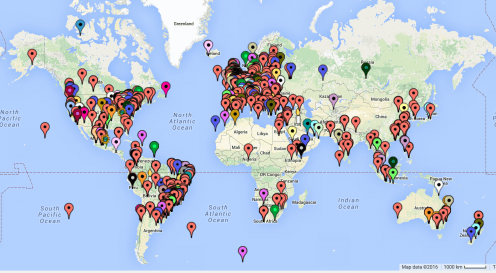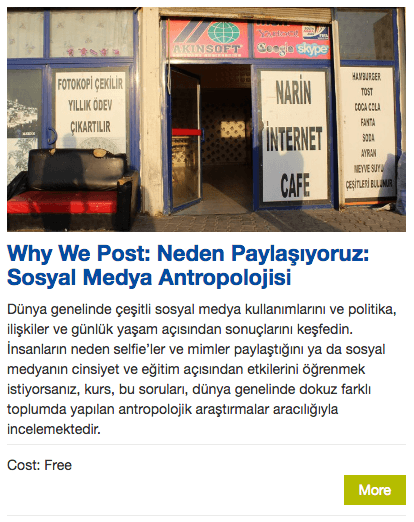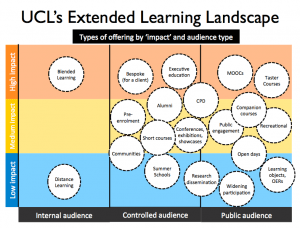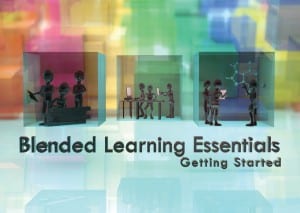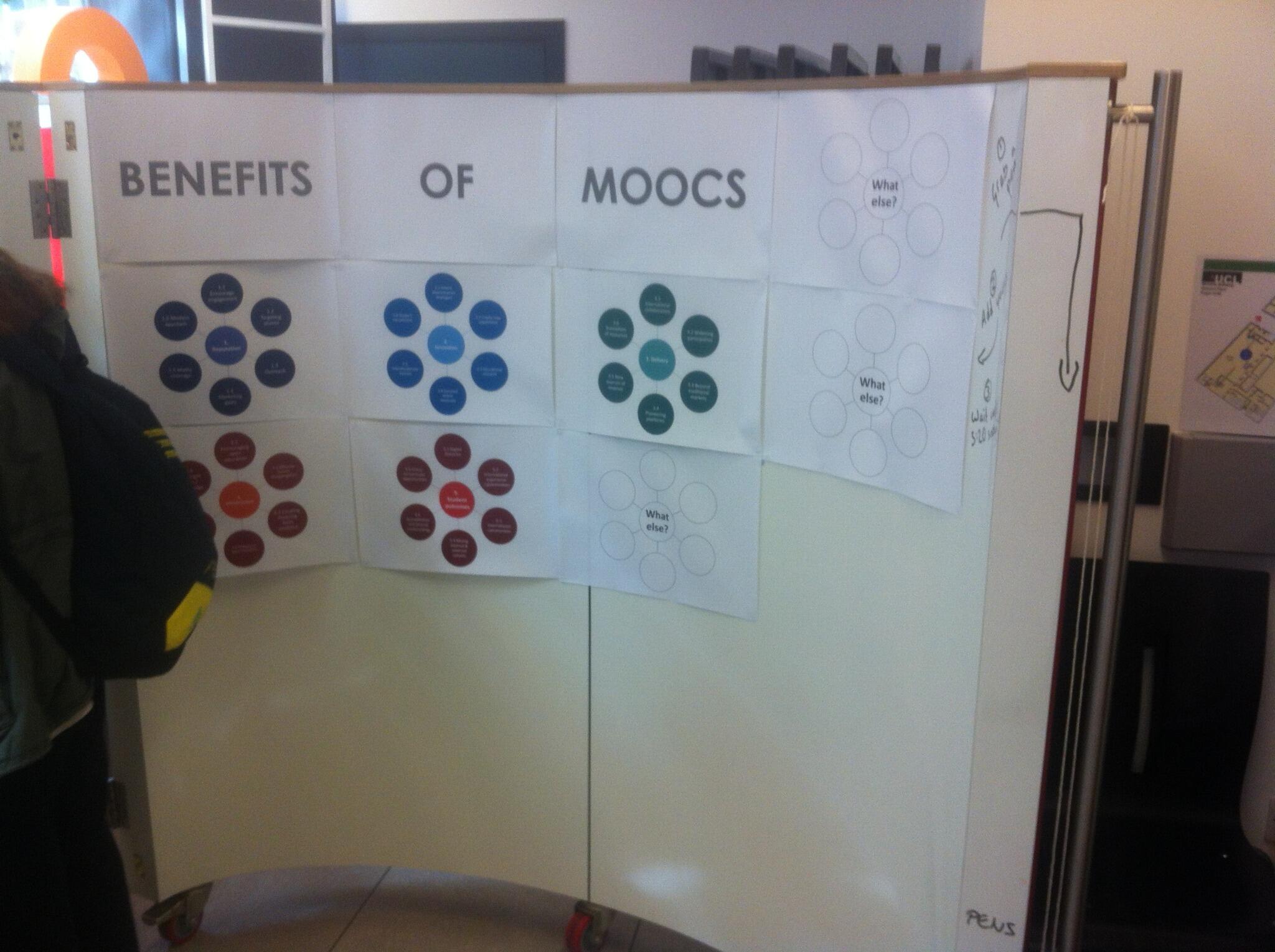You can’t get away with poor academic practice for long, so before anyone picks me up on it – here’s the original (unpublished) excerpts I had planned to write a paper on. I appreciate it’s rough (and not ready) but this is a decaying document, so in the spirit of openness, please reuse and remix as much of this as you can:
Benefits of MOOCs?
The hypothesis is that an institution which develops (a small number of) Moocs using a vendor using an established platform, can acquire skills and knowledge through this process which can be beneficially applied to other areas. For instance to improve blended learning for on-campus students and also distance learning CPD courses. This would probably only happen where an institution has integrated its technical and support staff into the Mooc development process so they acquire knowledge and skills rather than just taking a turnkey package where the institution provides the Mooc platform provider with the current content which they then convert with little involvement from the institution
Pedagogy & teaching approach
“We can use MOOCs to create a successful flipped classroom. We can use our “previous classroom time” for meaningful conversations. As Mazur and Beicher have demonstrated, this can be done even in large lectures by having students work in small groups.” Martin, F.G. (2012)
“One of the choices made by Fox and Patterson in designing their campus course was to give students a quick introduction to their chosen software development process and tools at the start of the course. This enables students to start practicing software development after only a few hours of instruction” Pre-enrolment exercises for their on-campus students Ardis, M.A., & Henderson, P.B. (2012).
“The bitter truth, however, is that academic pedagogy has never been very good. It is well established that a professorial soliloquy is an ineffective way of teaching. We do know what works and what does not work when it comes to teaching. Much has been written in the last few years about “active learning,” “peer learning,” “flipping the lecture,” and the like, yet much of academic teaching still consists of professors monologuing to large classes. We could undoubtedly improve our teaching, but MOOCs are not the answer to our pedagogical shortcomings.” Vardi, M. Y. (2012).
“MITx, and all such similar initiatives, are still delivering a Learning 1.0 product in a Web 2.0 world” Butin, D.W. (2012).
“MITx has stumbled into is the opportunity to create a never-tiring, self-regulating, self-improving system that supports learning through formative on-demand feedback. Formative “just in time” feedback (rather than summative “end of course” testing) is the holy grail for learning theorists because it turns unidirectional teaching concerned mainly with delivering knowledge into a recursive guide and springboard for learning.” Butin, D.W. (2012).
“MITx will offer new opportunities to study how people learn best online – whether those learners are our on-campus students, university students elsewhere, or non-university learners – and how virtual communities of learners are built” Reif, L.R. (2012).
“President Reif, then Provost Reif, announced MITx on 19 December 2011. Many are getting on board, while others remain skeptical, but one happy consequence is unquestionable: we discuss how we teach more now than ever before.” King, J., Orlin J., Verghese, G., Winston P.H. (2013).
“Maybe the big benefit is a great chain of teaching. Instead of faculty and TAs, everyone is a TA, helping, at the low end, to teach a subject just learned, and at the high end, to provide the big picture and access to what is new and exciting.…Many say they learn a subject best when they teach it, so why not have everyone solidify their learning by teaching…Electronically facilitated, every MIT student could spend time teaching material just learned to those just learning, deepening understanding on both sides.” King, J., Orlin J., Verghese, G., Winston P.H. (2013).
“Maybe the big benefit is the inverted / flipped classroom” King, J., Orlin J., Verghese, G., Winston P.H. (2013).
- “Asynchronicity is a defining feature of open online learning, with implications for how we study it. Open enrolment periods and unrestricted use of course resources raise important questions for analysis and design” Ho et. al. (2014)
- “HSPH students, for the first time this fall, have the option to take blended versions of the biostatistics and epidemiology introductory courses that are taking advantage of the existing courseware available in HarvardX, making more time available in class for more interactive learning. This “flipped” approach represents one way that HarvardX is encouraging experiments in online learning on campus. Reich et al (2014b).
- “One new innovation to bring all three groups together is the Discussion Circle. In the residential setting facilitated by Professor Nagy, a group of students are invited each week to hold a “fishbowl discussion” in front of the rest of the class, a mechanism to invite a smaller group of students from a large class into a more focused dialogue. These discussants are then required to act as provocateurs in a forum discussion thread, where learners from beyond the college are invited to engage in a dialogue on the issues of the week. This is one example of the ways that HarvardX can connect students in Cambridge to learners in the wider world.“ Reich et al (2014b)
- some of the edX teaching fellows were current students in the Harvard Law School course. One of the principal hypotheses underlying the course was that this would generate pedagogic benefits – most importantly, that the quality and durability of the HLS students’ understanding of copyright law would be enhanced by teaching the material to others. Reich et al (2014c)
- Creating A permanent community – Several of the graduates of the 2013 version of the course expressed interest in continuing to participate in discussions about recent developments in copyright law. Our tentative plan is to try to satisfy their interest in two related ways. First, we plan to invite all alumni of CopyrightX 2013 to engage in the plenary synchronous discussion forum (“the forest”) associated with CopyrightX 2014. Second, if that forum proves vibrant, we plan to continue to host it after the conclusion of the 2014 version of the course. Reich et al (2014c)
“what happens when we take the learning elements that are created for online courses, using new technology, and bring them in to change the way teaching takes place in Harvard via the inverted or flipped classroom?” Bol, P. & Reich, J. (2014).
- “As course development teams get more confidence in what they are doing, or as courses come into their second or third run they can question what are the most important issues they are dealing with and how can we do design research that helps us try out new pedagogies that help us explore new ideas that help us develop new tools? Another challenge is thinking about how can we design these kinds of studies that are asking how can we do ChinaX better, how can we make the teaching of Chinese culture and history better, at Harvard, among historians, at Harvard, and across the world. Bol, P. & Reich, J. (2014).
- “We improved on the classroom experience in several ways” Mitros et. al. (2013)
- The massive scale of the classroom has participants on-line 24/7, allowing students to ask questions and receive peer answers in almost real-time. Mitros et. al. (2013).
- “Our Edinburgh MOOCs offered us a route to experimentation with online delivery methods at large scale, and gave us a chance to learn lessons that might be applied elsewhere in our educational portfolio” MOOCs@Edinburgh Group (2013).
- “One spin-off from our early engagement with MOOCs has been a lively internal debate about pedagogy, online learning and costs/benefits of university education. Designing online courses for tens of thousands of learners has been challenging but exciting, and we intend to encourage the discussions to continue.” MOOCs@Edinburgh Group (2013).
- “The key opportunity for institutions is to take the concepts developed by the MOOC experiment to date and use them to improve the quality of their face-to-face and online provision, and to open up access to higher education. “Yuan, L., Powell, S., Oliver, B. (2014).
- “MOOCs have stimulated widespread discussion around the pedagogical approaches of teaching and learning in institutions. The current dominant approach of MOOCs is very similar to established models of online distance learning and is generally based on the production of video lectures, written resources and staged e-assessments with automated feedback. However, the early MOOCs embraced the social nature of learning by valuing learners’ existing knowledge and experience in the course and using alternative pedagogical approaches and there are significant opportunities to explore this further” Yuan, L., Powell, S., Oliver, B. (2014).
- Pedagogical innovation and level of experimentation is determined by the context, for example individual lecturers may be at very different levels of experience and expertise. Yuan, L., Powell, S., Oliver, B. (2014).
- “notion of ‘flipped classroom’ where approaches like this can then be incorporated into existing programmes becomes an interesting possibility for innovative provision” Yuan, L., Powell, S., Oliver, B. (2014).
- “edX presents new opportunities for MIT students to engage in meaningful international experiences while also providing invaluable access to MIT for MITx students in 860 local communities” MIT Task Force (2013)
- “One potential new source of revenue is the use of digital learning technologies to leverage on-campus course instruction, coupled with some form of paid certification. “MIT Task Force (2013)
- “Integrating a micro Open Online Course within a formal university course in parallel with the free international OERu learners significantly increases interaction and reduces attrition measured by the analysis of page views of the course materials for the duration of the course.” Davis, N., Mackintosh, W. (2013)
“A variation on the MOOC is the “supersized” classroom. For example, John Boyer, a professor at Virginia Tech, taught an introductory course, ‘World Regions’, to 2,670 students. He allowed students to attend in-person or online, communicating via Facebook and Twitter, and he used Skype to bring in world figures to talk with the class” Mehaffy, G.L. (2012).
“During MOOCs, librarians can interact directly with participants in a facilitating or coaching capacity using our skills in reference, instruction, and emerging technologies to wayfind, aggregate, filter, model, amplify, and stay present” Mahraj, K. (2012).
“librarians can take on roles in wayfinding and filtering to support sense-making and critical thinking by commenting on participants’ blog posts that describe struggles to assess the validity of sources. Similarly, librarians can aggregate a set of posts to highlight patterns in participants’ struggles with and methods for source evaluation and synthesis” Mahraj, K. (2012).
“Librarians can teach appropriate behavior around intellectual property by modeling the use of attribution in scholarly and creative work. While providing support as coaches or navigators, librarians can also amplify discussions around topics such as critical appraisal, personal knowledge management, intellectual property, and many other topics.” Mahraj, K. (2012).
“MITx has the potential to “dramatically improve the productivity of education and the access to quality education worldwide, and will transform the nature of our residential learning environment.” Reif, L.R. (2012).
“MITx offers MIT the opportunity to shatter barriers to education. Only a tiny fraction of the world’s population who are capable and motivated to learn MIT content has the privilege of attending MIT” Reif, L.R. (2012).
6.002x is the first electronic circuits course to be taught online to tens of thousands of students. The goal of the 6.002x experiment was to explore ways to use computer assisted instruction to surpass the quality of traditional residential teaching. By providing superior on-line content delivery and assessment, we hope to both be able to educate people without access to education, and to improve residential education by allowing professors to focus on higher value tasks. Mitros et. al. (2013).
“While there is still much debate surrounding the pros and cons of MOOCs, the value of this new development requires some fundamental re-thinking in the context of developing a wider strategy for open online learning and open education. MOOCs have been useful in bringing new ideas for developing business models and pedagogic approaches to improve the quality and accessibility of online and campus teaching and learning in higher education. Coupled with the changing environment of higher education, the disruptive effect of MOOCs will be felt significantly. Yuan, L., Powell, S., Oliver, B. (2014).
With the maturing of MOOCs and the particular maturing of online technologies in education, institutions will need a balanced provision of online and on campus solutions in order to respond strategically to the challenges and opportunities facing higher education that will emerge in the future.” Yuan, L., Powell, S., Oliver, B. (2014).
Learning materials
- “the courseware is also being used by students from Harvard College enrolled in the General Education course on campus, and students both in Cambridge and online who are enrolled in the course through the Harvard Extension School. All three groups of learners have embarked together on another experiment in learning, sharing the same course materials and discussion forums. ” Reich et al (2014b)
When asked to rate their overall experience of planning, preparing and running a MOOC as either ‘Poor’, ‘Fair’, ‘Good’, ‘Very good’ or ‘Excellent’, the majority of respondents (66%) rated their experience as ‘Good’, while the remaining 44% rated their experience as ‘Fair’ Grainger, B. (2013).
When asked to estimate the amount of time spent preparing their MOOC before it began (excluding filming), 83% of respondents spent at least 10 hours a week in preparation, with the remainder working 5-10 hours each week on preparation Grainger, B. (2013).
The survey also invited free text responses in order to provide further context to the course teams’ answers. The key themes coming out of these responses were the sheer workload involved in planning and developing the content, and the resources required for video production on top of the individuals’ ‘regular’ jobs. Creating effective strategies to manage the large number of participants in the MOOC forums was also reported as a challenge. Grainger, B. (2013).
Technology
- “decided that partnership with an existing MOOC provider was preferable to developing an Edinburgh-own platform, it gave us greater speed to explore new educational techniques, and it provided a better opportunity for greater reach for our courses. We also gained access to an expanding peer community of institutions which were developing these new courses” MOOCs@Edinburgh Group (2013).
- “the greatest opportunities lay in developing online courses within a new educational environment (fully-online, open to all regardless of prior qualifications or geographical location, with no fee), and gaining outreach to new audiences” MOOCs@Edinburgh Group (2013).
- “reinforce our position as a leader in the use of educational technology in higher education” MOOCs@Edinburgh Group (2013).
- MOOCs pose a set of challenges for the existing technology and the way that it is managed in that they require access to courses for large numbers of learners.
- MOOC developments are causing institutions to re-visit online distance learning and consider how they can better use technology to reduce costs, create efficiency in their teaching operations, demonstrate value, and reach new markets Yuan, L., Powell, S., Oliver, B. (2014).
Analytics
MOOCs have provided the opportunities to learn more about what makes students more successful, then giving instructors (and the platforms themselves) the chance to nudge those students accordingly. These analytics provide information that help predict academic demand, tracking course success, preventing dropout, enabling social integration and reporting information for state, federal and accreditor purposes. For academics, analytics provide information about student success, areas of misunderstanding, levels of effort, persistence and other details about learning and online activity. Mehaffy, G.L. (2012).
- “New metrics, far beyond grades and course certification, are necessary to capture the diverse usage patterns in the data” Ho et. al. (2014)
- Interpret findings from new enterprise Harvard convened the HarvardX Research Committee, MIT announced the Office of Digital Learning. These two bodies have been working to understand, organize, analyze, interpret, and disseminate the data that edX delivers to its founding institutions. Ho et. al. (2014)
- Creating meaning from learning analytics “Registrants must click on the “courseware” to meet the definition of “viewed,” and they must click on half or more of the “chapters” (the primary tabs on the left, in this case, CB22X: Coming Soon, Hour 0, Hour 1…) to meet the definition of “explored.” Ho et. al. (2014)
- Students can actively monitor their current levels of mastery and to self-pace in response. They can identify and break through misconceptions before moving on to more advanced material . Mitros et. al. (2013).
- The platform allows for substantial data collection on testing, allowing us to incrementally and scientifically improve courses” Mitros et. al. (2013)
Assessment and evaluation
Student evaluations – how can teachers provide feedback/grades for students on a large scale without reducing quality (or resorting to fully automated or peer-graded work) Hyman, P. (2012).
Certification – what are the rewards for completing a course, and what will entice students towards completion? Hyman, P. (2012).
- There are opportunities for experimentation in assessment in areas such as discussion contributions to courses (like HarvardX and Edinburgh postgraduate students being involved in MOOCs) e-portfolio, peer evaluation, dependency-based certificates, and ‘badges’, institutional credit. But there are some established issues with the assessment and accreditation too. Yuan, L., Powell, S., Oliver, B. (2014).
- “Course certification rates are misleading and counterproductive indicators of the impact and potential of open online courses.“ Ho et. al. (2014)
- Open online registration is not equivalent to enrolment in conventional courses, where traditional enrollment generally entails monetary costs, opportunity costs, and accountability. Ho et. al. (2014)
- “focusing on certification rates alone penalizes desirable activities like browsing and exploring courses, which open online courses are generally designed to support.” Ho et. al. (2014)
- “considerable differences in average demographics across courses” Ho et. al. (2014)
- “Course exploration and certification may benefit from synchronous course schedules and the cohorts that they build. Managing asynchronicity to maintain registrant involvement regardless of enrollment date is an ongoing challenge for instructors and a fertile area for future research. “Ho et. al. (2014)
- “micro-credential should be considered for future offerings.” Davis, N., Mackintosh, W. (2013)
Business models and other areas
“Part of the excitement around MOOCs is about their potential to change education’s cost equation—put a great course online once, and run it unattended many times. But part of the fun of the fall AI course was that Thrun and Norvig were right there with us, and that we were a large cohort of students there with them.” Martin, F.G. (2012)
“one of the major barriers, for those who advocate the widespread use of OER and the provision of processes for obtaining formal qualifications from these studies, has been institutional concern over the challenge this presents for established business models in higher education.” Bull, D. (2012).
“Offer a low-cost and no-frills service’ for education” Anderson, T., & McGreal, R. (2012).
“public campuses and online systems do not adapt and move to exploit these network affordances, then it leaves a tremendous opportunity that can (and will) be filled by private, for profit entrepreneurs” Anderson, T., & McGreal, R. (2012).
Is it fair to say that benefits from MOOCs have yet to be realised? Hyman, P. (2012 0 or link to the other three and more).
Business models – how can this model of free education become self-sustaining? Hyman, P. (2012).
“It is important to keep in mind that our campus residential model not only provides the best education environment to MIT students, but it is also at the heart of knowledge creation and dissemination. Without MIT, there is no MITx. Similarly, MITx is not MIT. Each offers a different educational environment and experience.” Reif, L.R. (2012).
“MIT has the opportunity – and we feel that it has an obligation – to help preserve U.S. higher education as a public good by offering a not-for-profit option in online education. In the United States, we have dedicated public and private assets in enormous amounts to the public good of higher education” Reif, L.R. (2012).
“maybe we are not being bold enough, if we are only discussion development around our current experiences and not thinking about the whole experience, the wider picture. What about doubling the size of UG intake, enabled by a more efficient MOOC-based teaching or creating more intensified UROP experiences.” King, J., Orlin J., Verghese, G., Winston P.H. (2013).
- “describing MOOCs as though they are a monolithic collection of courses misses the differential usefulness and impact MOOCs may have from sector to sector.” Ho et. al. (2014)
- “The substantial enrollments and participation in these two courses, which might be considered more of a niche subject compared to other offerings like an introduction to computer science, suggest that online courses may have a promising role to play in fulfilling HSPH’s mission of improving health outcomes and increasing quality of life around the world.” Reich et al (2014b)
“Harvard and MIT need to learn to compete in this space.” Bol, P. & Reich, J. (2014).
2 – “70% of people taking HarvardX courses are non-US. They have an obligation towards our civilisation and the world” Bol, P. & Reich, J. (2014).
3 – “to improve the way we learn, and we teach” (at Harvard, and beyond) – hence the research community attached to HarvardX Bol, P. & Reich, J. (2014).
- The research itself is of a benefit to the university, and they are in the right position to make it. Bol, P. & Reich, J. (2014).
“the amount of effort that can be invested into a course is much greater when it can be amortized across tens of thousands”. Mitros et. al. (2013)
“students completing a MOOC have begun to enrol on University of London International Programmes’ flexible and distance learning degree pathways” Grainger, B. (2013).
Most importantly, the understanding gained should be used to inform diversification strategies including the development of new business models and pedagogic approaches that take full advantage of digital technologies.” Yuan, L., Powell, S., Oliver, B. (2014).
Service Disaggregation: Unbundling and Re-bundling: If is pursued, institutions will need to identify new ways of packaging, planning and organising their courses, services and learning support activities. They can then focus on their unique disciplinary, reputational and/or geographical strengths.” Yuan, L., Powell, S., Oliver, B. (2014).
“opportunity as those institutions which re-bundle effectively may find a way to take advantage of MOOCs by incorporating them into revenue-producing degree programmes” Yuan, L., Powell, S., Oliver, B. (2014).
“Possible strategic choices based on the purpose behind the development of a MOOC might include being defensive, Offensive, for Marketing, Enhance existing provision, Change existing provision or Financial. Yuan, L., Powell, S., Oliver, B. (2014)..
“It is important to recognise that new and innovative products and services will require organisational changes and the development of new capabilities across the organisation’s processes, technology and people”. Yuan, L., Powell, S., Oliver, B. (2014).
MOOCs themselves in the development of new forms of provision go beyond HEI’s existing markets. This has the potential to lead to greater choice for learners about how, when and what they study, but not necessarily to the detriment of existing providers. Yuan, L., Powell, S., Oliver, B. (2014).
Idea Bank – a space online for members of the MIT community to share their views on the Future of MIT’s Education- https://future.mit.edu/ideabank MIT Task Force (2013)
“The unbundling of courses, introducing modularity and adding flexibility into courses is all very interesting development. Adding a top-down approach to decompose courses into modules and a bottom-up approach to engineer a curriculum into core concepts.” MIT Task Force (2013)
“We will need to balance our desire to not limit access with the need to create a sustainable financial model”.” MIT Task Force (2013)
Student inclusion by encouraging spaces which are ‘open to all’ and under no auspicious banner of an elite university Waard et al. (2014).
References
Anderson, T., & McGreal, R. (2012). Disruptive pedagogies and technologies in universities. Education, Technology and Society, 15(4), 380-389. Retrieved from http://www.ifets.info/journals/15_4/32.pdf.
Ardis, M.A., & Henderson, P.B. (2012). Software engineering education (SEEd): Is software engineering ready for MOOCs? ACM SIGSOFT Software Engineering Notes, 37(5), 14-14.
Bol, P. & Reich, J. (2014). HarvardX and MITx: The First Year of Open Online Courses. MITx Working Paper #1. Last accessed 17/02/14 from http://www.youtube.com/watch?v=Y8Bic69fS_Q
Bull, D. (2012). From ripple to tsunami: The possible impact of MOOCs on higher education. DE Quarterly, 2012 Spring, 10-11.
Butin, D.W. (2012). What MIT should have done. eLearn Magazine, June 2012. Retrieved fromhttp://elearnmag.acm.org/featured.cfm?aid=2263018
Clarke, D. (2014). EdX’s MOOCman Anant Agarwal loves hype! Blog post. Last accessed 04/02/14 from http://donaldclarkplanb.blogspot.co.uk/2014/02/edxs-moocman-anant-agarwal-loves-hype.html
Daniel, J. (2014). MOOC’s: What Will Be Their Legacy? Global Trends of Online Teaching and Learning. International Symposium, Open University of Japan. Last accessed 18/02/14 from http://sirjohn.ca/wordpress/wp-content/uploads/2012/08/140207-Japan-OUTX.pdf
Davis, N., Mackintosh, W. (2013). A MOOC Prepared to Make a Difference. DEANZ Magazine. November 2013. University of Canterbury e-Learning Lab. Last accessed 17/02/14 from http://ir.canterbury.ac.nz/bitstream/10092/8767/1/12647056_DEANZ%20Magazine%20nov13%202.pdf
Downs, S. (2013). MOOC – Diversity and Community in Online Learning. Keynote presentation delivered to 26e Entretiens Jacques Cartier, Lyon, France. Last accessed 02/02/14 from http://www.downes.ca/presentation/331
Grainger, B. (2013). University of London International Programmes Massive Open Online Course (MOOC) Report 2013. Last accessed 17/02/14 from http://www.londoninternational.ac.uk/sites/default/files/documents/mooc_report-2013.pdf
Ho, A.D., Reich, J., Nesterko, S., Seaton, D.T., Mullaney, T., Waldo, J., & Chuang, I. (2014). HarvardX and MITx: The first year of open online courses (HarvardX Working Paper No. 1). http://papers.ssrn.com/sol3/papers.cfm?abstract_id=2381263
Hyman, P. (2012). In the year of disruptive education. Communications of the ACM, 55(12), 20-22.
King, J., Orlin J., Verghese, G., Winston P.H. (2013). Editorial: What’s next with MITx. MIT Faculty Newsletter, Vol XXV, No. 4, March / April 2013.Last accessed 17/02/14 from http://web.mit.edu/fnl/volume/254/editorial.html
Martin, F.G. (2012). Will massive open online courses change how we teach? Communications of the ACM, 55(8), 26-28. Retrieved from http://dl.acm.org/citation.cfm?id=2240246
Mahraj, K. (2012). Using information expertise to enhance massive open online courses. Public Services Quarterly, 8(4), 359-368.
Mehaffy, G.L. (2012). Challenge and change. EDUCAUSE Review, September/October 2012, 25-41. Retrieved from http://net.educause.edu/ir/library/pdf/ERM1252.pdf
MIT Task Force (2013). Institute-wide Task Force on the Future of MIT Education: Preliminary Report. Future of MIT Education. Last accessed 17/02/14 from https://future.mit.edu/preliminary-report
Mitros, P.F., Afridi, K.K., Sussman, G.J., Terman, C.J., White J.K., Fischer, L. and Agarwal A. (2013). Teaching Electronic Circuits Online: Lessons from MITx’s 6.002x on edX. IEEE 19 May 2013
MOOCs@Edinburgh Group (2013). MOOCs @ Edinburgh 2013: Report #1. Last accessed 17/02/14 from http://hdl.handle.net/1842/6683
Price, E. (2013). Quality Assurance for Massive Online Open Courses. Last accessed 20/02/14 from http://www.londoninternational.ac.uk/sites/default/files/governance/qasl24/qasl24_3-mooc-qa.pdf
Reif, L.R. (2012). MITx: MIT’s Vision for Online Learning. MIT Faculty Newsletter, Vol. XXIV, No. 3, Jan/Feb 2012. Last accessed 17/02/2014 from http://web.mit.edu/fnl/volume/243/reif.html
Reich, J., Emanuel, J., Nesterko, S., Seaton, D.T., Mullaney, T., Waldo, J., Chuang, I., & Ho, A.D. (2014a). HeroesX: The Ancient Greek Hero: Spring 2013 course report (HarvardX Working Paper No. 3).
Reich, J., Nesterko, S., Seaton, D.T., Mullaney, T., Waldo, J., Chuang, I., & Ho, A.D. (2014b). Health in Numbers and Human Health and Global Environmental Change: 2012-2013 Harvard School of Public Health course reports (HarvardX Working Paper Series No. 2).
Reich, J., Nesterko, S., Seaton, D.T., Mullaney, T., Waldo, J., Chuang, I., & Ho, A.D. (2014c). JusticeX: Spring 2013 course report (HarvardX Working Paper Series No. 4).
Vardi, M. Y. (2012). Will MOOCs destroy academia? Communications of the ACM, 55(11). Retrieved from http://cacm.acm.org/magazines/2012/11/156587-will-moocs-destroy-academia/fulltext
Waard, I., Gallagher, M.S., Zelezny-Green, R., Czerniewicz, L., Downs, S., Kukulska-Hulme, A., Willems, J. (2014). Challenges for conceptualising EU MOOC for vulnerable learner groups. Proceedings of the European MOOCs Stakeholders Summit 2014. Last accessed 18/02/14 from http://www.emoocs2014.eu/sites/default/files/Proceedings-Moocs-Summit-2014.pdf
Yuan, L., Powell, S., Oliver, B. (2014). Beyond MOOCs: Sustainable Online Learning in Institutions. CETIS Publications. Last accessed 17/02/14 from http://publications.cetis.ac.uk/2014/898
 Close
Close



